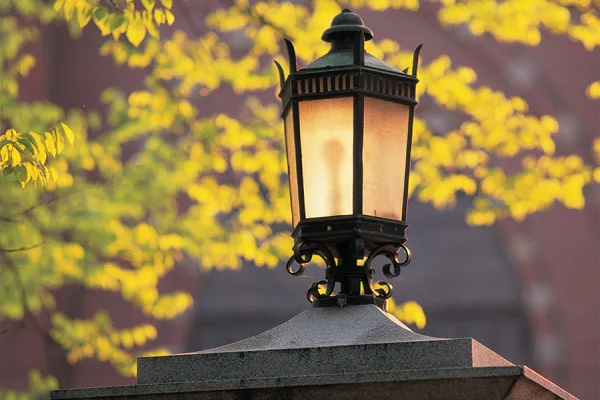Campus Forum Aims to Help Community ‘Move Forward’ After Ferguson
Events

Published September 4, 2014
Listening to students in her Afro-American studies classes, Assistant Professor Riché Barnes has found that many are hungry for answers to difficult questions.
Particularly when events such as this summer’s fatal police shooting of an unarmed African American teenager in Ferguson, Mo., are in the spotlight. “There are questions students and the larger community have,“ Barnes said. “They want to understand why this is happening.”
Barnes is the moderator for a September 8 forum that aims to explore broader questions sparked by Michael Brown’s death, the police response and nationwide protests that followed the shooting.
“Putting Ferguson in Context(s),” scheduled for 4:30 to 6:30 p.m. in Weinstein Auditorium, will ask four scholars who are experts in African American history and culture, politics, criminal justice and social protest to “help make connections and show why Ferguson isn’t an isolated situation,” Barnes said.
The event will also offer audience members a chance to ask questions of the experts. (See below for panelist biographies).
Barnes noted that it is sometimes challenging for people who have grown up in the post-Civil Rights era to understand the roots of police violence aimed at the African American community in Ferguson and other communities of color.
“Since the election of President Obama, it’s easy for some to say, ‘Everything is great. Why are people still talking about racism?'” Barnes said. “What we’re hoping to do is give some of the long view and offer the community a way to move forward, move past Ferguson.”
The September 8 forum is a joint effort of several academic departments, including Afro-American studies, government, philosophy and sociology, as well as the Program for the Study of Women and Gender and the Center for Community Collaboration.
Alice Hearst, a professor of government and one of the lead organizers of the forum, noted that the event builds on the August 30 talk on campus by sociologist Claude Steele, whose book on stereotypes was this year’s summer reading selection for first-year students.
“This is a good way for the whole community to keep discussing difficult, contemporary issues,” Hearst said. “We hope to have an event like this every year.”
Jennifer Walters, dean of religious life and director of the Center for Community Collaboration, said she hopes the forum on Ferguson will inspire ongoing conversations at Smith about racism and all forms of discrimination.
“That’s part of what a college is for,” said Walters, who approached Hearst initially with the idea for the September 8 event. “Students need opportunities to connect what they see going on in the world with what happens in the classroom,” Walters said. “And as a college, we need opportunities to think about what there is in our environment that hinders any student from succeeding.”
At her speech at Convocation September 3, President Kathleen McCartney cited the forum about Ferguson as an example of how Smith will continue to grapple with “engaging provocative ideas” through campus discourse.
“Throughout the year we will talk about things that are hard, heated and polarizing,” McCartney said. “In doing so, we will model the best of an engaged citizenry and an intellectual community.”
The panelists for “Putting Ferguson in Context(s)” are:
- Christina Greer, assistant professor of political science at Fordham University in New York City. Greer’s research and teaching center on American politics, black ethnic politics, urban politics, quantitative methods, campaigns and public opinion. She is currently researching the history of African Americans who have run for executive office in the United States. Greer was a former Mendenhall Fellow in the government department at Smith.
- Samuel K. Roberts, associate professor of history at Columbia University and of sociomedical sciences at Columbia’s Mailman School of Public Health. Roberts has taught and written about the history of African Americans, public health and social movements in the United States. In July, he became director of Columbia’s Institute for Research in African American Studies, and he also serves as policy coordinator for a newly launched criminal justice initiative involving several different schools at Columbia.
- James Smethurst, associate professor of Afro-American studies at the University of Massachusetts Amherst. Smethurst has authored books on African American poetry, the Black Arts Movement and the Harlem Renaissance. His scholarly interests include African American literature, ethnic studies and gender studies. Smethurst is now working on a history of the Black Arts Movement in the American South and is co-editing an anthology with John Bracey and Sonia Sanchez.
- Christopher Tinson, assistant professor of African American studies at Hampshire College. Tinson’s interdisciplinary research and teaching encompasses ethnic studies, media studies and criminal justice. He has served as a youth mentor to high school and juvenile detention centers in the Pioneer Valley. Tinson is also host of TRGGR Radio, a “hip-hop-rooted social justice” radio program.